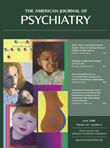The Caregiving Environments Provided to Children by Depressed Mothers With or Without an Antisocial History
Abstract
Objective: Many depressed women have a history of antisocial behavior, but research into maternal depression has not ascertained if this has implications for children of depressed mothers. This study compared the developmental outcomes in and caregiving environments provided to children by depressed mothers with or without an antisocial history. Method: In the Environmental Risk Longitudinal Twin Study, a nationally representative study of 1,106 families, mothers were administered the Diagnostic Interview Schedule for Major Depressive Disorder and interviewed about their lifetime history of antisocial personality disorder symptoms. Mothers and teachers provided information regarding the children’s behavior problems at 5 and 7 years of age. The authors assessed the quality of the caregiving environment through maternal reports and interviewer observations. Results: Compared with children of mothers with depression only, the children of depressed and antisocial mothers had significantly higher levels of antisocial behavior and rates of DSM-IV conduct disorder, even after the authors controlled for numbers of symptoms and chronicity of maternal major depressive disorder. The children of depressed and antisocial mothers were at an elevated risk of experiencing multiple caregiving abuses, including physical maltreatment, high levels of maternal hostility, and exposure to domestic violence. Conclusions: If one ignores the common co-occurrence of an antisocial history in depressed mothers, it may obscure the significantly elevated risks in children’s development. Clinicians treating women’s depression should be aware that children of depressed and antisocial mothers constitute a group at extremely high risk for early-onset psychopathology.



